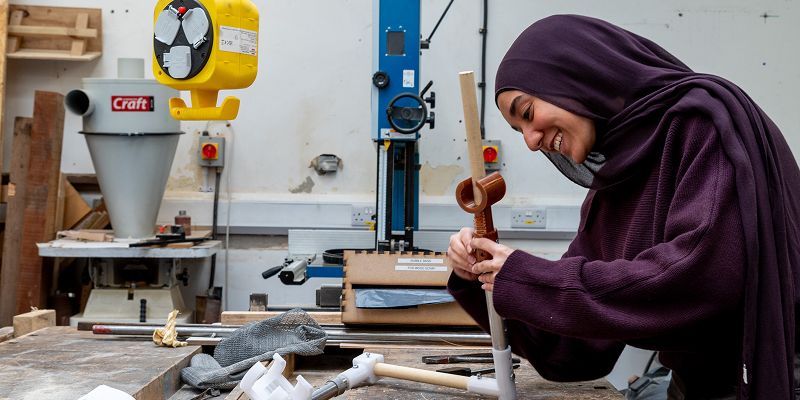A Leeds alum helped bring together the University and a UK charity to create bespoke solutions for disabled people.
The School of Mechanical Engineering has begun an exciting collaboration with REMAP, a UK charity that improves the quality of life for people who experience disability.
REMAP volunteers make and adapt equipment to meet the unique needs of individuals when no suitable alternative exists.
The new collaboration will see students in mechanical and medical engineering, as well as product design, create bespoke solutions to help with everything from mobility and personal care to enabling people to pursue their hobbies and ambitions.
Fareda Al Wakeel (Medical Engineering 2024) began volunteering for REMAP after graduating from Leeds and helped bring the two organisations together.
"As a REMAP volunteer, you get to work directly with clients and make a difference to people's lives," Fareda said. "It made sense to me that students could lend their skills to the charity, while gaining experience of working with clients directly and having a real impact."
"I remember the client telling me what I'd made was brilliant. That feedback stays with you and it motivates you."
Fareda has fond memories of her first case, when she supported a client with rheumatoid arthritis who was no longer able to hold her make-up brush.
"I set about designing a new brush. It took a few iterations. At first, the material in my prototype was too rough, the grip was uncomfortable, the angle was a bit wrong. I learnt to take that feedback on board and made alterations until I got it right."
Fareda worked from a local workshop called Leeds Hackspace, a community run non-profit workshop open to all. She was also able to make use of expertise and facilities at the University – particularly in 3D printing – to create the final version of the extendable makeup brush handle that would accommodate different sizes of brush.
"Many of the REMAP volunteers are retired engineers or carpenters, and they bring a different set of skills and experiences to my own. I brought expertise from Leeds and skills in 3D printing. That means we complement each other really well.
"I remember the client telling me what I'd made was brilliant. That feedback stays with you and it motivates you."

Fareda has now worked on eight projects with REMAP. Recognising the value to students, the charity, and clients, she introduced staff at REMAP to academic leads in the School of Mechanical Engineering, who also saw the potential of students working on REMAP cases.
"I can't wait to see what the Leeds students achieve through their projects," Fareda said. "They will gain real satisfaction from seeing their engineering skills help solve real problems for people."
Students will need to empathise with clients, whilst drawing on creativity and technical skills to design real-world solutions. For Fareda, the experience gave her an appreciation of how her studies at Leeds could improve life quality for others, and how solutions don't have to be complicated.
"The medical engineering sector is very innovative and technical with complex areas like medical robotics. But I've learnt that there are also also simpler modifications which aren't commercially available.
"Thanks to REMAP, I have the opportunity to develop those solutions and change lives."






